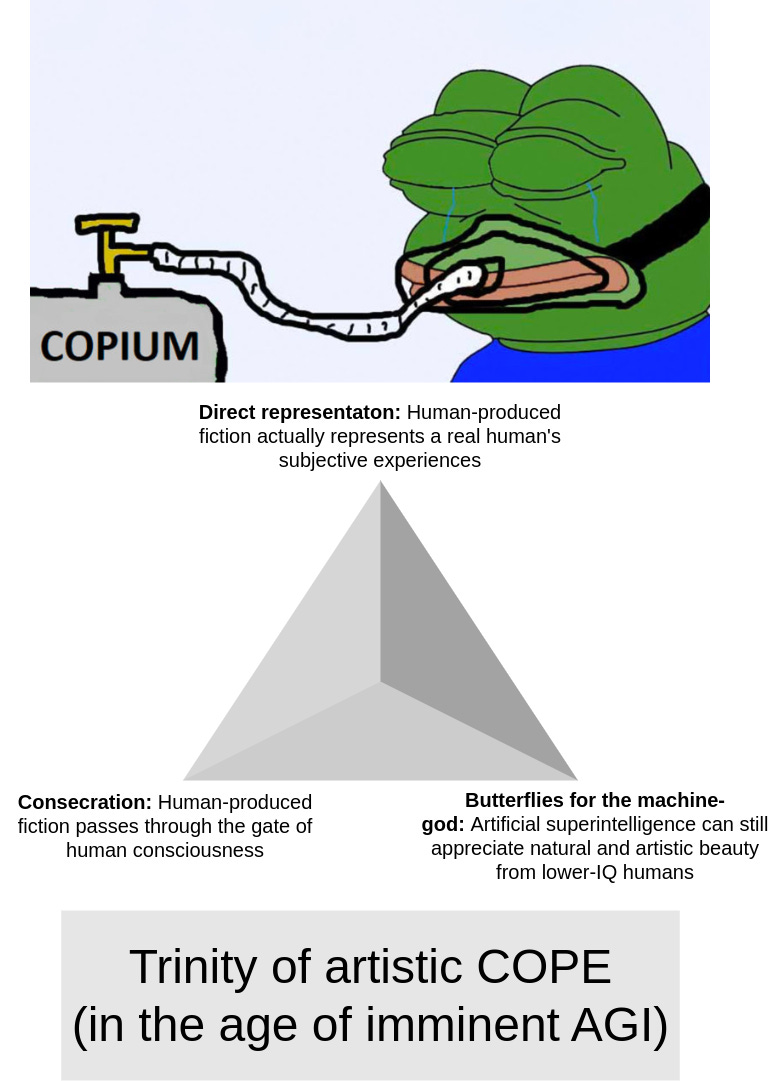Butterflies for the machine god: Fiction Maximalism in the twilight of the species
i.e. why do we even care about this stuff? + major dose of copium
I was sitting on the bus the other day, and I saw an old guy, something like sixty plus, scrolling through Tik Tok, thinking to myself—this is it, isn’t it? We’re living through a major inflection point in human history, aren’t we? The whole of the species arcing toward a single point—toward wireheading, toward AR and VR mediated dopamine slavery, and maybe, toward human extinction altogether.
I asked myself—why the fuck am I writing books? Nobody reads books. Even I don’t read nearly as many books as I do SubStacks and internet articles. This old guy almost certainly used to read books (back when paperbacks were a precursor for scrolling on smartphones), but probably, he will not read a book ever again. Why would he?
Simple answer: I like writing books. I like reading books. Not everyone has been captured into the algorithmic prison of machine-human feedback loops (yet). Writing and reading fiction is a flow state activity. It’s rewarding. It’s spiritually nourishing in a way that any form of screen-based entertainment or leisure is not.
The counter to this: hardly anyone reads books.
The counter to the counter: what if that’s okay?
Now look—I’m not an elitist, I’m certainly not of the elite class (otherwise I wouldn’t be a writer, LOL), and I dislike people who refer to themselves as elites (whether warranted or not). This impulse of mine isn’t a noble one; it’s almost certainly due to a combination of petty jealousy and aesthetic programming from growing up working class.
Nonetheless, here is the truth, even as we approach the black hole of species-wide dopamine slavery: freedom is when you bind yourself to something beyond hedonic optimization. Freedom is a book between your hands. Freedom is your brain manually constructing an internalized virtual reality from the visual poverty of symbols of the page—it’s your brain engaging, not ingesting. The ability to do this is nothing less than an expression of cognitive and spiritual sovereignty over the reins of the machines.
I call this position FICTION MAXIMALISM.
Yes, dear reader, it mean that YOU AND I ARE BOTH VERY SPECIAL SNOWFLAKES INDEED.
Counterintuitively, some types of class are decoupled from class—“many who are first will be last, and many who are last will be first.” Lagging the trend here is good (at this point, you should picture you and I shaking hands on the matter).
As the population of humans trends toward totalizing capture by algorithmically optimized modes of entertainment, fiction appreciators will increasingly become a spiritually elite class. I don’t even mean this in terms of taste, per se: even the ability to read some topical YA novel in analog form is arguably a meaningful level of cognitive differentiation relative to the event horizon where all of us are seemingly heading (please do not ever accuse me of not being inclusive).
I half-remember an old tweet from Tony Tulathimutte where I think he commented that fiction is destined to become a conservatory form, i.e. somewhat similar to classical music. Generally, I don’t like classical music (I’m a prole who thinks it’s boring), but that tweet stuck with me and the years have proven him directionally correct. Anybody with an analog book is an outlier now.
Okay but what about LLM’s replacing fiction writers
This, of course, is the truly worrisome scenario—even as our increasingly tiny monastery of wordcels remains.
We seem to be headed into a scenario where LLM’s are going to continue improving for awhile, and it wouldn’t not surprise me if they can put out MFA-tier prose within a couple of years (this is technically a compliment, not a jab). I saw Richard Ngo make roughly this prediction a couple months back, and I found this incredibly depressing. Apparently there are harder technical problems with maintaining narrative continuity across a novel length work but SudoWrite and others may well solve that problem down the line as well.
Further, we could also imagine a scenario where novels are algorithmically produced and optimized for specific individuals, drawing upon their specific areas of interest and the enormous personal datasets associated with them (imagine a book centered around the exact scenario of your life, where you are the protagonist, written in a style that is catered to you as an individual, etc.).
These scenarios, to me, would feel like the death of the medium.
Machine intelligence is a shredder for human meaning, and in a hilarious twist of fate, we are tracking a scenario where creative work is automated well before manual labor due to robotic development lagging comparable strides in LLM’s.
So, because it is necessary for a human being to have meaning in order to live, and because I have made the (probably catastrophic) decision to invest so much of my life’s meaning into art, I’ve been thinking about how to cope with what’s coming.
I call this the TRINITY OF ARTISTIC COPE, and the arguments generalize to basically all forms of human art, not just the stuff produced by word supremacists:
A la Erik Hoel, fiction is something like a storage medium for human consciousness—even for fictive human consciousness. It’s the process of taking a conscious experience—the subjective experience of fictionalized persons, as simulated in a writer’s mind—and bottling it into textual form. Insofar as it’s just capturing this stream of conscious experience, fiction is tautologically valuable relative to machine-produced text, because it’s an actual representation of a specific human being’s subjective experiences.
LLM’s are not conscious. Even if LLM’s improve in their prose-writing or characterization or plot-writing or whatever, they’re still p-zombies—there’s nothing “there” there. There is no experience of being an LLM—at least not yet. Now, given that so much of our creative output stems from an unconscious “black box”—the production of words feels automatic when you’re in a flow state—one might argue that we are not too disimilar from LLM’s. Probably most of our creative computation is happening at the level of a similar black box that happens to be instantiated in meat instead of silicon. That’s where the stream of consciousness originates.
However, even though the stream of consciousness originates in the black box of the unconscious, whenever a novelist’s thoughts and feelings pass through the gate of consciousness, they are consecrated. These thoughts and feelings are intrinsically more valuable than floating point numbers rearranging themselves on a fucking graphics card (please excuse the bile, I’m not really trying to go Ted K over here). Probably, they are nothing less than a form of antimaterialist magic (yes, I am doxxing myself as a panpsychic).
In short: thoughts and feelings that are first experienced by a conscious entity (and only then transcribed) and only then transcribed retain some of thing lingering specialness, and this specialness is not solely due to its representational aspect. It’s because of something that happened to them—the process of consecration.Probably at some point we make a superintelligent AI, and probably it’s sufficiently complex so as to be conscious and have an actual internal experience (I would really hope this is the case if it replaces us altogether). Probably, it can create artistic works, including fiction, that far surpass the meaning and power and creativity of ours, while still remaining legible to our limited cognitive abilities. Still, this gap in capability is not sufficient to completely erase the meaning of our own artistic output. Some works are notable on a relative, not absolute basis of comparison.
In the same way that a biologist might come across an interesting fossil of a uniquely formed butterly from some prehistoric age, appreciating its beauty and keeping it for future preservation—the machine god might well say: “Hmm, it seems like this fellow wrote quite an interesting story. This one—this one, I’ll keep.”






"Classical music is boring"
You absolute cad!
In an age where it's so fucking over, we're so fucking back is always just around the corner. There's a spark to human creation that can't be mimicked efficiently or consistently over the long haul, you can see this with AI visual art even now. Some of the art AI produces is rather aesthetic, some of it I might just hang on my wall, but none of it resonates with me like say a singer-sargent piece, or even weebshit produced by mangaka. There's a divine element to human works that can't be removed or replaced, this holds true for all mediums even the written word.